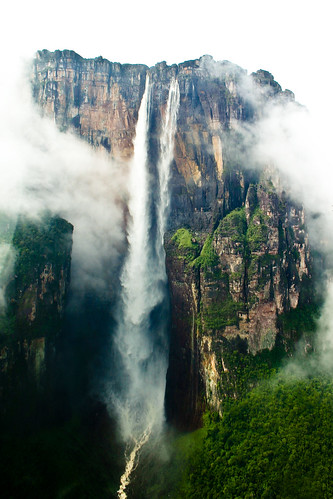This post was originally written for Th!nk About It: Developing World.
 In Venezuela, we have the cheapest gas prices in the world. We pay $0.12 per gallon, when the same amount of water costs around $2.5 (and I'm talking about controlled dollar, not even real black-market one). We have 5.218.942 automotor vehicles in circulation, from which a 5th is located in Caracas, and we consumme over 827 tonnels of oil a day.
In Venezuela, we have the cheapest gas prices in the world. We pay $0.12 per gallon, when the same amount of water costs around $2.5 (and I'm talking about controlled dollar, not even real black-market one). We have 5.218.942 automotor vehicles in circulation, from which a 5th is located in Caracas, and we consumme over 827 tonnels of oil a day.According with the International Energy Agency, Venezuela is the fourth most contaminating country in Latin America: it throws into the atmosphere annually over 140 million tons of carbon dioxide. Only last year, Venezuela throw 171593 was in the 29th place in the list of countries by carbon dioxide emissions (UN report). And it is relevant to know that those figures have mantained since the 90s. So, we emit 0.6% of all CO2 and we have 0.4% of all world population. And we seem to be OK with that.
But, it's that OK?
Well, no, it isn’t.
Venezuela is considered to be among the world's 17 most biodiverse countries, but it also has one of the highest rates of deforestation in Latin America. Between the 70s and the 80s, in Venezuela were destroyed over six million ha., wich is equivalent to Costa Rica's whole territory.
The biggest amount of forests are located in the area surronding the Orinoco, and it is calculated that only one third of this forests still survives.
We mantain a deforestation rate of 0,6% each year, wich means around 288 ha. every year since 1990.
The governmental report sustains that "Venezuela has given example of conservation, through the creation of the Tree Mission, for instance. This mission tends to the recuperation of certain trees and plants that were in danger of extinction".
In this sense, if one goes to the website of Misión Árbol (Mission Tree), one can see that it claims 18.322 ha. were planted between 2006 and 2008, from wich 65% were protective. It also claims, by the way, that 96% of the population has access to potable water, and I claim they should try to take a shower in my bathroom.
Between 1990 and 2005, Latin America's greenhouse gas emissions rose in a billion of metric tons.
That means Latin America generates over 7% of all greenhouse gas emissions of the world, and that over 8% of those emissions come from Venezuela, a country that have under 5% of Latin America population. That's not justifiable, even though over 50% of our PIB comes from industry, especifically from oil industry.
Oil, coal and gas exploitation are devastating our main hidrographic and forestal zones, even when they are theorically "protected" areas because of the existence of menaced species. Rivers are polluted with organic and inorganic waste, even oil spills, and the balance of water is distorted, thus affecting the habitat of thousands of plant and animal species.
Illegal mining in the border between Venezuela and Brazil is also an environmental issue, which affects national parks and indigenous reservations, menacing the Amazonia. The basin of the Caura river, which is the habitat for 2.600 species of plants, 168 of mammals, 475 birds, 34 amphibians, 53 reptiles and 441 fish identified to date, and absorbs over 700 million tons of carbon, equivalent of emissions of 162 million cars in one year, is being invaded by irregular settlements of people who seek to exploit gold without any kind of official control. The illegal exploitation of gold generates huge amounts of mercury, wich pollute water and are therefore ingested by animals and people.
We've just been through the longest drought since 1947, which consequences we're still experiencing, and our main rivers, located in the Canaima region, and which provide 70% of our electric power, are menaced by all kind of causes. ¿Is it possible that still, our government sustains that we accomplished environmental sustainability?
The beautiful photo of the Salto Ángel belongs to Inti, in Flickr, and it's under this Creative Commons license, which code I tried and failed to copy here.
No comments:
Post a Comment